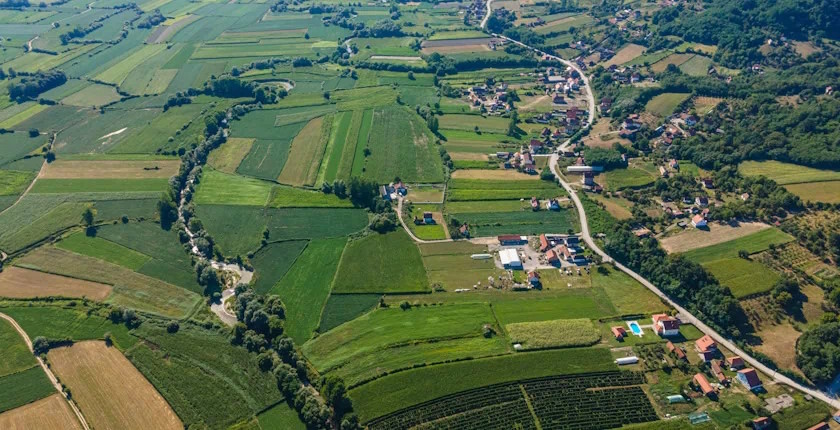EU’s strategic status for Rio Tinto’s lithium project risks fueling tensions in Serbia
After the European Commission declared Rio Tinto’s project Jadar a strategic raw materials project, the company and Serbian officials claimed it implies the strictest environmental protection standards and that it would enable the creation of up to 20,000 highly qualified jobs. The opposition and local and environmentalist activists vowed to continue to resist the plan to launch a lithium mine and processing facility, and accused the European Union of colonialism.
The addition of the planned lithium mine near the city of Loznica in Serbia to the EU’s strategic projects for essential raw materials has again stirred up public controversy in the country, after several waves of social unrest. Rio Tinto stressed that it remains committed to dialogue with all stakeholders.
Brnabić: It’s not true that Serbia is a European mining colony
Both the global mining giant and Serbia’s National Assembly Speaker Ana Brnabić claim that project Jadar would enable the creation of up to 20,000 jobs. The environmental standards for similar projects in the EU will need to be completely replicated, she asserted. It also shows that it’s not true that Serbia is a European mining colony, like what certain people said, Brnabić added.
“We won’t be exporting our lithium, but use it for improving the standard of living,” she stated.
Of note, the European Union only endorsed the mining segment of the project as strategic, while Rio Tinto has also published plans for a processing facility for jadarite, a lithium and boron mineral.
Ecological Uprising’s leader Aleksandar Jovanović Ćuta says decision is death sentence
Member of parliament Aleksandar Jovanović Ćuta called on citizens, students and environmentalist organizations to an “all-out mobilization” and added that they wouldn’t allow lithium to be mined. He is the most prominent figure in the Ekološki ustanak (Ecological Uprising) movement. “A death sentence has been signed for everything in the Jadar valley that breathes, lives, moves and flows,” and the population in the affected area in western Serbia was “designated the destiny of becoming environmental refugees,” in his opinion.
“Anyone who includes such projects in their agendas, whether it is the European Union or Russia – such people don’t want anything good for us,” Jovanović said.
The opponents of project Jadar are accusing the EU and Serbian authorities of colonialist relations
The Kreni-promeni (Go-Change) movement, which has representatives in local parliaments in the largest cities, recalled that the Government of Serbia abolished the Jadar project in early 2022, following large environmental protests and blockades. “The latest attempts to revive the project were preceded by the controversial ruling of the Constitutional Court, which Kreni-promeni deems synchronized and contrary to the principles of the rule of law and the constitutional separation of powers,” its statement adds.
The country’s parliament never voted on a people’s initiative, signed by over 38,000 citizens, even though it was legally obligated to.
Assigning the strategic status is a new proof of colonial policy toward Serbia, which is supposed to secure raw materials for the stumbling automotive industry in the EU, according to Novi DSS, a right-wing parliamentary opposition party. There can be no jadarite mining, it stressed in its reaction.
Not enough transparency or local population’s participation in decision making
The EU’s strategic projects lack proper safeguards, transparency, and local involvement – putting human rights, indigenous rights, and environmental protection at serious risk, the EU Raw Materials Coalition (EURMC) said in a statement published by the European Environmental Bureau (EEB), a network of environmentalist groups.
It risks repeating colonial patterns of resource extraction, they warned. Several selected projects from the new list are in countries outside of the EU with weak industrial governance systems, nongovernmental organizations underscored.
Matković: The EU just added fuel to the fire
Endorsing project Jadar despite unresolved legal, environmental, and social issues suggests a troubling disregard for public opposition and due process, EEB said. The move risks reigniting tensions on the ground, it warned.
“The EU just added fuel to fire. It backed an authoritarian regime and a corporation against whom 63% of the population now stand to fight at a time when the entire country is under blockade and violence. The EU will thus lose support in Serbia and the region and probably cause further social unrest. The fact that the Serbian President Aleksandar Vučić announced the board’s decision more than a week before it was public, also raises questions of legitimacy behind the decision,” said Aleksandar Matković, a research associate from the Institute of Economic Sciences in Belgrade, Serbia.
EU fueling euroscepticism
Berlin-based Heinrich Böll Stiftung – Foundation argued that with its new move, the EU ignored the lack of rule of law in Serbia and intense domestic opposition to Rio Tinto’s investment in Serbia.
“Activists and students involved in the pro-democracy movement argue that the EU’s endorsement undermines democratic voices and risks fueling Euroscepticism in the region. With Serbia’s government under pressure from ongoing protests and corruption allegations, the EU’s move is seen as politically damaging and potentially destabilizing,” it said.
The foundation is in close relations with German opposition party Alliance 90/The Greens.
Balkan Green Energy News has published a chronological overview of the key events since 2001, when Rio Tinto arrived in Serbia.

